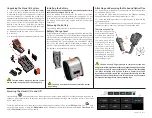
51
A.2 Three-point correction
The three-point, or Morton-Stubbs correction uses two reference
wavelengths, usually those on either side of the analytical wavelength.
The background interfering absorbance at the analytical wavelength is
then estimated using linear interpolation (see Figure A2).This method
represents an improvement over the single-wavelength reference
technique because it corrects for any background absorbance that
exhibits a linear relationship to the wavelength. In many cases, if the
wavelength range is narrow, it will be a reasonable correction for
non-linear background absorbances such as that resulting from
scattering of from a complex matrix
.
Fig A2



































